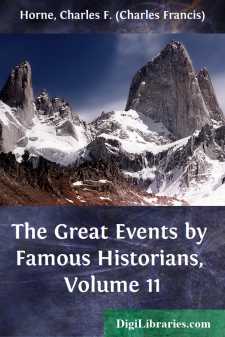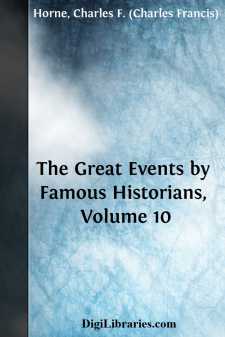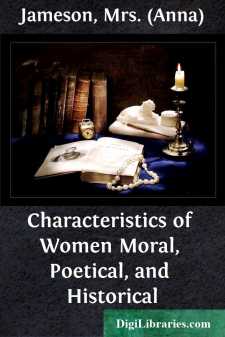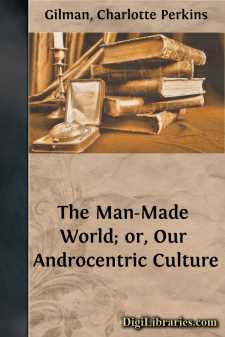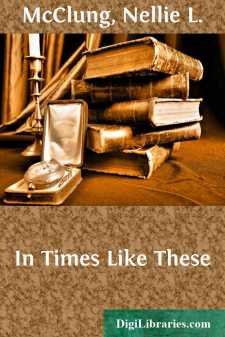History
- Africa 30
- Americas (North Central South West Indies) 50
- Ancient 68
- Asia 58
- Australia & New Zealand 8
- Canada 41
- Caribbean & West Indies 1
- Civilization 20
- Eastern Europe 12
- Europe 310
- Expeditions & Discoveries 60
- General 77
- Historical Geography 1
- Jewish 9
- Latin America 3
- Medieval 8
- Middle East 13
- Military 248
- Revolutionary 8
- Study & Teaching 5
- United States 353
- Western Europe 56
- World 13
History Books
Sort by:
THE GREAT EVENTS (ERA OF POLITICAL-RELIGIOUS WARS) CHARLES F. HORNE Gazing across the broader field of universal history, one comes more and more to overlook the merely temporary, constantly shifting border lines of states, and to see Western Europe as a whole, to watch its nations as a single people guided by similar developments of the mind, impelled by similar stirrings of the heart, taking part in...
more...
THE GREAT EVENTS (THE PERIOD OF THE ROMAN EMPIRE) CHARLES F. HORNE So vast and wonderful a construction was the Roman world, so different from our own, that we are apt to imagine it as an arrangement far more deliberately planned, far more mechanically complete, than it appeared to its own inhabitants. From a cursory glance, we may carry away wholly mistaken conceptions of its thought and purpose....
more...
CHARLES F. HORNE Philip II succeeded his father Charles V on the throne of Spain. The vast extent of his domains, the absoluteness of his authority, and, above all, the enormous wealth that poured into his coffers from the Spanish conquests in America, made him the most powerful monarch of his time, the central figure of the age. It was largely because of Philip's personal character that the great...
more...
B.C. 413SIR EDWARD SHEPHERD CREASYThat great writer of the history of the Romans, Thomas Arnold, says of the defeat of the Athenian fleet at Syracuse: "The Romans knew not, and could not know, how deeply the greatness of their own posterity, and the fate of the whole western world, were involved in the destruction of the fleet of Athens in the harbor of Syracuse. Had that great expedition proved...
more...
by:
Peter C. Welsh
This history of woodworking hand tools from the 17th to the 20th century is one of a very gradual evolution of tools through generations of craftsmen. As a result, the sources of changes in design are almost impossible to ascertain. Published sources, moreover, have been concerned primarily with the object shaped by the tool rather than the tool itself. The resulting scarcity of information is somewhat...
more...
General Introduction THE GREAT EVENTS BY FAMOUS HISTORIANS is the answer to a problem which has long been agitating the learned world. How shall real history, the ablest and profoundest work of the greatest historians, be rescued from its present oblivion on the dusty shelves of scholars, and made welcome to the homes of the people? THE NATIONAL ALUMNI, an association of college men, having given this...
more...
CHARACTERISTICS OF WOMEN. INTRODUCTION. Scene—A Library. ALDA. You will not listen to me? MEDON. I do, with all the deference which befits a gentleman when a lady holds forth on the virtues of her own sex.He is a parricide of his mother's name,And with an impious hand murders her fame,That wrongs the praise of women; that dares writeLibels on saints, or with foul ink requiteThe milk they lent...
more...
PRECEDING CAUSES. As civilization advances there is a continual change in the standard of human rights. In barbarous ages the right of the strongest was the only one recognized; but as mankind progressed in the arts and sciences intellect began to triumph over brute force. Change is a law of life, and the development of society a natural growth. Although to this law we owe the discoveries of unknown...
more...
I. AS TO HUMANNESS. Let us begin, inoffensively, with sheep. The sheep is a beast with which we are all familiar, being much used in religious imagery; the common stock of painters; a staple article of diet; one of our main sources of clothing; and an everyday symbol of bashfulness and stupidity. In some grazing regions the sheep is an object of terror, destroying grass, bush and forest by omnipresent...
more...
THE WAR THAT NEVER ENDS If, at last the sword is sheathed,And men, exhausted, call it peace,Old Nature wears no olive wreath,The weapons change—war does not cease. The little struggling blades of grassThat lift their heads and will not die,The vines that climb where sunbeams pass,And fight their way toward the sky! And every soul that God has made,Who from despair their lives defendAnd struggling...
more...


